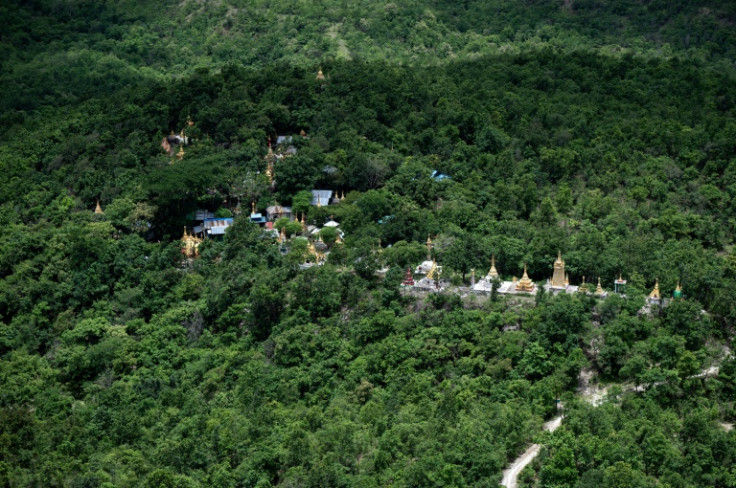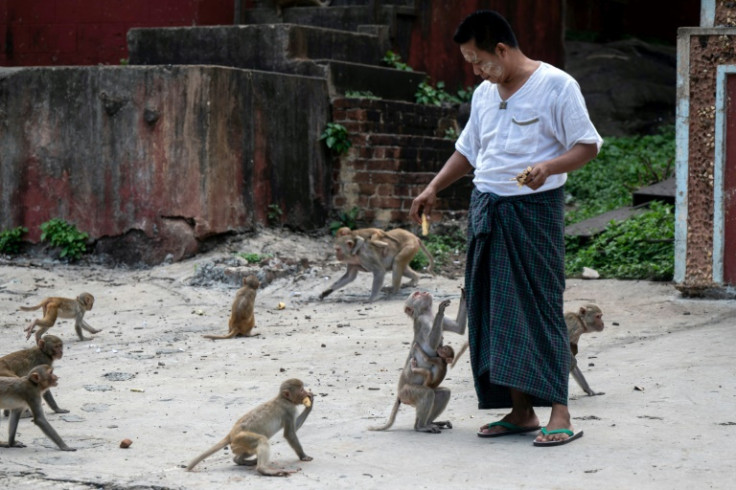War In Myanmar Heartlands Silences Volcano Shrine

A shrine perched on an extinct volcano in Myanmar once thronged with the bustle of pilgrims praying to flower-eating spirit Popa Maedaw, but civil war has cut the complex off from the faithful.
Now, the prayers have fallen silent at the Taung Kalat shrine, the plains around it a battle zone and the faithful mostly blocked from access by fighting and checkpoints manned by all sides in the conflict.
Myanmar has been in turmoil since 2021, when the military ousted Aung San Suu Kyi's government, ending a 10-year experiment with democracy and sparking nationwide protests.
The junta's crackdown on dissent sparked renewed fighting with ethnic minority armed groups in the borderlands and sent thousands to join newer "People's Defence Forces" formed to battle the military.
"There are not many young people here anymore," said one shop owner on the road that winds up through thick forest to the summit of Mount Popa, the extinct volcano.
"They have gone to join the PDF."
The plains surrounding Mount Popa are home to the Bamar ethnic majority and were largely untouched by decades of previous conflict between the military and minority armed groups in the remote jungles and hills.
Now the region of rolling fields of sesame, pulses and beans -- studded with the golden spires of Buddhist pagodas -- is a battle zone.
PDF fighters use homemade mines to ambush military convoys and regularly assassinate local officials accused of working with the junta.
The junta has armed and trained civilian militias and its troops are accused of razing villages and massacring inhabitants suspected of supporting the PDFs.
The warring sides use checkpoints along roads they control to levy "taxes" on travellers.
On the road to neighbouring Myingyan district, a group of villagers told AFP to turn back.
"The situation is bad if you go that way," said one.
In May PDF fighters killed dozens of people, including civilians, in a raid on a pro-military village in Myingyan, according to local media reports.
Days later, north of second city Mandalay, the well-known abbot of a monastery was shot dead by security forces at a checkpoint.
The junta initially blamed PDF fighters, but later said its forces were responsible.
The Taung Kalat shrine honours Popa Maedaw, one of dozens of nats, or guardian spirits, that exist alongside Buddhism in Myanmar.
Devotees believe she has the power to grant wishes.
They also believe she was a flower-eating ogress who turned into a beautiful woman when she fell in love with a royal emissary -- and that she later died of heartbreak when the monarch ordered her beloved's murder.
Along the shrine's steep stairway, tiles record donations to the shrine made by senior officers from the military that has ruled Myanmar for most of its history since independence from Britain.
One of the Popa Maedaw statues is said to resemble Aung San Suu Kyi, Myanmar's democracy figurehead and the military's most famous foe.
Ahead of elections in 2020 officials from her National League for Democracy (NLD) party held a private ceremony at the Taung Kalat shrine to ask for victory, according to senior party sources.
The NLD later won a landslide, trouncing its military-backed rival.
The military made unsubstantiated claims of massive fraud, and seized power again in February 2021, sparking a civil war now in its fourth year.
Struggling to crush resistance across Myanmar, in February the military announced conscription of men aged 18-35 to shore up its ranks.
At the Taung Kalat shrine, a woman from the town of Pyin Oo Lwin made an offering for the success of her small business, holding a wad of notes against her forehead as a priest recited a mantra.
Pyin Oo Lwin, about a six-hour drive away, is home to the military's elite officer training academy.
In recent days ethnic minority fighters have battled junta troops to within around 50 kilometres (30 miles) of the town.
At the base of the shrine, there were few customers to buy the flower offerings, toys or T-shirts set out in stalls.
Some offered slingshots and sticks to ward off the hordes of monkeys that live on Mount Popa and off the donations of pilgrims.
Now pickings are slim, the primates are getting more aggressive, said one vendor selling water and bottles of juice on the stairway.
"When more visitors came here and fed the monkeys, they were fat and strong," she said.
"They are thin now because not many visitors come."



© Copyright AFP 2025. All rights reserved.





















